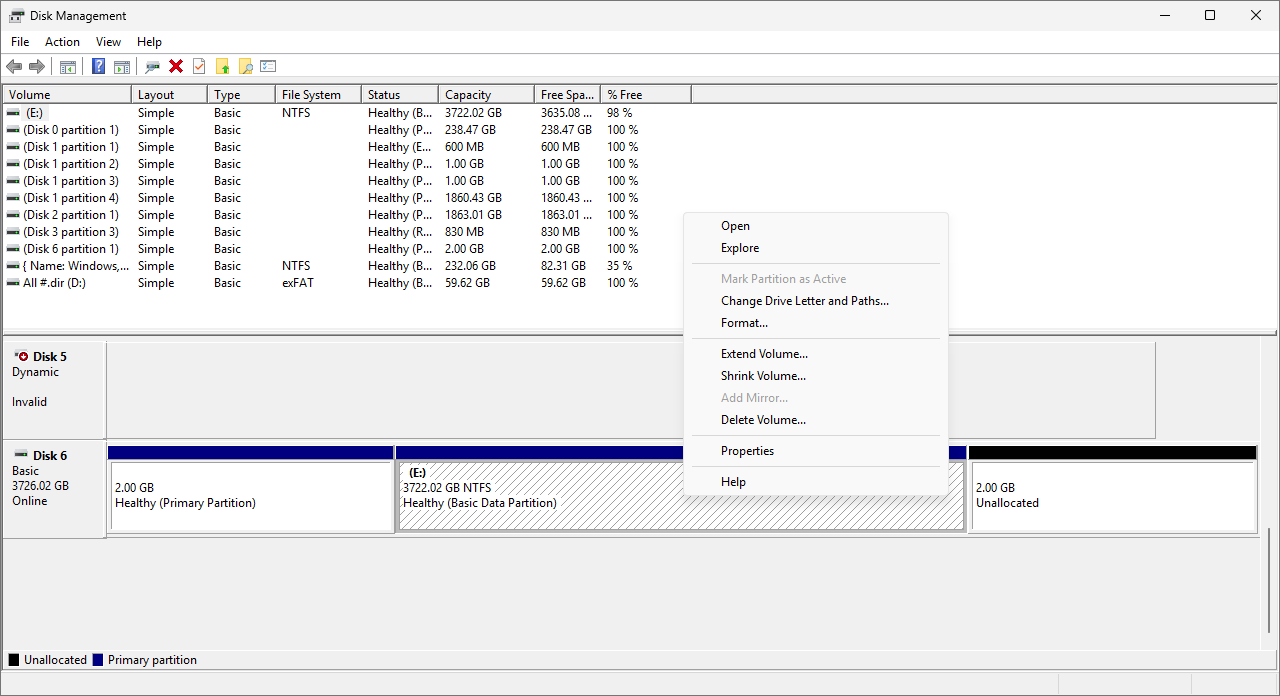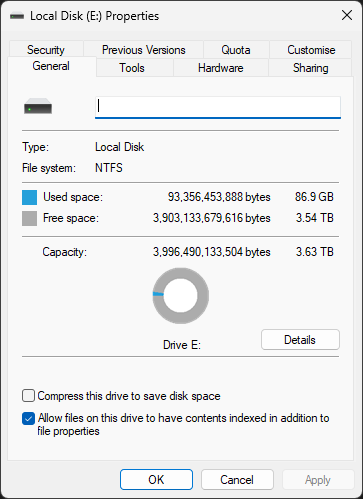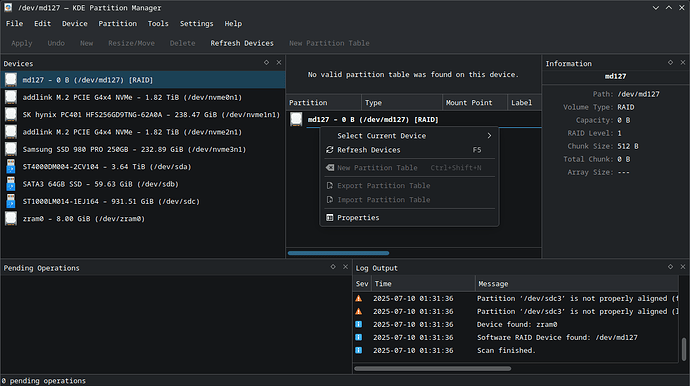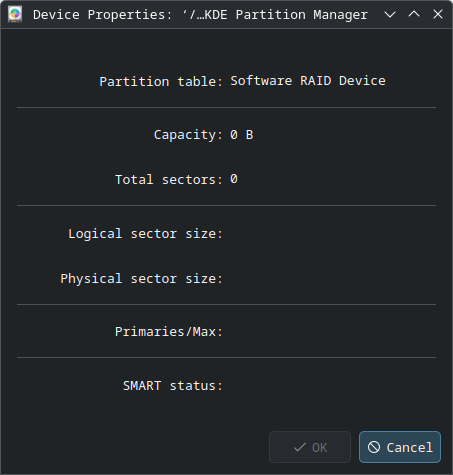I’ve extracted some SATA HDDs from a defunct NAS. When I view them in mmc diskmgmt.msc under Windows 11 Pro 24H2, I am able to format partitions and view information about the drive:
However, when viewed via kde-partitionmanager-25.04.3-1.fc42.x86_64, I am unable to see information about the HDD, much less modify it:
Additionally, I’ve not configured RAID, so even if it used to operate in a RAID array, it doesn’t now. Though, on that note, both drives appeared to contain quite different data, so I’ll be surprised if they really did operate in RAID (although many modes exist, all of which I’m unfamiliar with).
Environment
Get-PnpDevice -PresentOnly -InstanceId SCSI* | Format-List (devices) returns:
Caption : SK hynix PC401 HFS256GD9TNG-62A0A Description : Disk drive InstallDate : Name : SK hynix PC401 HFS256GD9TNG-62A0A Status : OK Availability : ConfigManagerErrorCode : CM_PROB_NONE ConfigManagerUserConfig : False CreationClassName : Win32_PnPEntity DeviceID : SCSI\DISK&VEN_NVME&PROD_SK_HYNIX_PC401_H\7&49A9269&0&000000 ErrorCleared : ErrorDescription : LastErrorCode : PNPDeviceID : SCSI\DISK&VEN_NVME&PROD_SK_HYNIX_PC401_H\7&49A9269&0&000000 PowerManagementCapabilities : PowerManagementSupported : StatusInfo : SystemCreationClassName : Win32_ComputerSystem SystemName : SXT4NQ ClassGuid : {4d36e967-e325-11ce-bfc1-08002be10318} CompatibleID : {SCSI\Disk, SCSI\RAW, Disk1667} HardwareID : {SCSI\DiskNVMe___________SK_hynix_PC401_HFS256GD9TNG-62A0A80000E00, SCSI\DiskNVMe___________SK_hynix_PC401_HFS256GD9TNG-62A0A, SCSI\DiskNVMe____SK_hynix_PC401_H0E00, SCSI\DiskNVMe____SK_hynix_PC401_H…} Manufacturer : (Standard disk drives) PNPClass : DiskDrive Present : True Service : disk PSComputerName : Class : DiskDrive FriendlyName : SK hynix PC401 HFS256GD9TNG-62A0A InstanceId : SCSI\DISK&VEN_NVME&PROD_SK_HYNIX_PC401_H\7&49A9269&0&000000 Problem : CM_PROB_NONE ProblemDescription : Caption : ASMT 2135 SCSI Disk Device Description : Disk drive InstallDate : Name : ASMT 2135 SCSI Disk Device Status : OK Availability : ConfigManagerErrorCode : CM_PROB_NONE ConfigManagerUserConfig : False CreationClassName : Win32_PnPEntity DeviceID : SCSI\DISK&VEN_ASMT&PROD_2135\B&82131EA&0&000000 ErrorCleared : ErrorDescription : LastErrorCode : PNPDeviceID : SCSI\DISK&VEN_ASMT&PROD_2135\B&82131EA&0&000000 PowerManagementCapabilities : PowerManagementSupported : StatusInfo : SystemCreationClassName : Win32_ComputerSystem SystemName : SXT4NQ ClassGuid : {4d36e967-e325-11ce-bfc1-08002be10318} CompatibleID : {SCSI\Disk, SCSI\RAW} HardwareID : {SCSI\DiskASMT____2135____________0___, SCSI\DiskASMT____2135____________, SCSI\DiskASMT____, SCSI\ASMT____2135____________0…} Manufacturer : (Standard disk drives) PNPClass : DiskDrive Present : True Service : disk PSComputerName : Class : DiskDrive FriendlyName : ASMT 2135 SCSI Disk Device InstanceId : SCSI\DISK&VEN_ASMT&PROD_2135\B&82131EA&0&000000 Problem : CM_PROB_NONE ProblemDescription : Caption : ST1000LM 014-1EJ164 SCSI Disk Device Description : Disk drive InstallDate : Name : ST1000LM 014-1EJ164 SCSI Disk Device Status : OK Availability : ConfigManagerErrorCode : CM_PROB_NONE ConfigManagerUserConfig : False CreationClassName : Win32_PnPEntity DeviceID : SCSI\DISK&VEN_ST1000LM&PROD_014-1EJ164\B&3897A7DD&0&000000 ErrorCleared : ErrorDescription : LastErrorCode : PNPDeviceID : SCSI\DISK&VEN_ST1000LM&PROD_014-1EJ164\B&3897A7DD&0&000000 PowerManagementCapabilities : PowerManagementSupported : StatusInfo : SystemCreationClassName : Win32_ComputerSystem SystemName : SXT4NQ ClassGuid : {4d36e967-e325-11ce-bfc1-08002be10318} CompatibleID : {SCSI\Disk, SCSI\RAW} HardwareID : {SCSI\DiskST1000LM014-1EJ164______0___, SCSI\DiskST1000LM014-1EJ164______, SCSI\DiskST1000LM, SCSI\ST1000LM014-1EJ164______0…} Manufacturer : (Standard disk drives) PNPClass : DiskDrive Present : True Service : disk PSComputerName : Class : DiskDrive FriendlyName : ST1000LM 014-1EJ164 SCSI Disk Device InstanceId : SCSI\DISK&VEN_ST1000LM&PROD_014-1EJ164\B&3897A7DD&0&000000 Problem : CM_PROB_NONE ProblemDescription : Caption : Samsung SSD 980 PRO 250GB Description : Disk drive InstallDate : Name : Samsung SSD 980 PRO 250GB Status : OK Availability : ConfigManagerErrorCode : CM_PROB_NONE ConfigManagerUserConfig : False CreationClassName : Win32_PnPEntity DeviceID : SCSI\DISK&VEN_NVME&PROD_SAMSUNG_SSD_980\5&1AB52423&0&000000 ErrorCleared : ErrorDescription : LastErrorCode : PNPDeviceID : SCSI\DISK&VEN_NVME&PROD_SAMSUNG_SSD_980\5&1AB52423&0&000000 PowerManagementCapabilities : PowerManagementSupported : StatusInfo : SystemCreationClassName : Win32_ComputerSystem SystemName : SXT4NQ ClassGuid : {4d36e967-e325-11ce-bfc1-08002be10318} CompatibleID : {SCSI\Disk, SCSI\RAW, Disk1667} HardwareID : {SCSI\DiskNVMe___________________Samsung_SSD_980_PRO_250GB2B2QGXA7, SCSI\DiskNVMe___________________Samsung_SSD_980_PRO_250GB, SCSI\DiskNVMe____Samsung_SSD_980_GXA7, SCSI\DiskNVMe____Samsung_SSD_980_…} Manufacturer : (Standard disk drives) PNPClass : DiskDrive Present : True Service : disk PSComputerName : Class : DiskDrive FriendlyName : Samsung SSD 980 PRO 250GB InstanceId : SCSI\DISK&VEN_NVME&PROD_SAMSUNG_SSD_980\5&1AB52423&0&000000 Problem : CM_PROB_NONE ProblemDescription : Caption : addlink M.2 PCIE G4x4 NVMe Description : Disk drive InstallDate : Name : addlink M.2 PCIE G4x4 NVMe Status : OK Availability : ConfigManagerErrorCode : CM_PROB_NONE ConfigManagerUserConfig : False CreationClassName : Win32_PnPEntity DeviceID : SCSI\DISK&VEN_NVME&PROD_ADDLINK_M.2_PCIE\9&15377ADD&0&000000 ErrorCleared : ErrorDescription : LastErrorCode : PNPDeviceID : SCSI\DISK&VEN_NVME&PROD_ADDLINK_M.2_PCIE\9&15377ADD&0&000000 PowerManagementCapabilities : PowerManagementSupported : StatusInfo : SystemCreationClassName : Win32_ComputerSystem SystemName : SXT4NQ ClassGuid : {4d36e967-e325-11ce-bfc1-08002be10318} CompatibleID : {SCSI\Disk, SCSI\RAW, Disk1667} HardwareID : {SCSI\DiskNVMe__________________addlink_M.2_PCIE_G4x4_NVMeEIFM31.6, SCSI\DiskNVMe__________________addlink_M.2_PCIE_G4x4_NVMe, SCSI\DiskNVMe____addlink_M.2_PCIE31.6, SCSI\DiskNVMe____addlink_M.2_PCIE…} Manufacturer : (Standard disk drives) PNPClass : DiskDrive Present : True Service : disk PSComputerName : Class : DiskDrive FriendlyName : addlink M.2 PCIE G4x4 NVMe InstanceId : SCSI\DISK&VEN_NVME&PROD_ADDLINK_M.2_PCIE\9&15377ADD&0&000000 Problem : CM_PROB_NONE ProblemDescription : Caption : SATA3 64 GB SSD SCSI Disk Device Description : Disk drive InstallDate : Name : SATA3 64 GB SSD SCSI Disk Device Status : OK Availability : ConfigManagerErrorCode : CM_PROB_NONE ConfigManagerUserConfig : False CreationClassName : Win32_PnPEntity DeviceID : SCSI\DISK&VEN_SATA3_64&PROD_GB_SSD\B&310BDCFF&0&000000 ErrorCleared : ErrorDescription : LastErrorCode : PNPDeviceID : SCSI\DISK&VEN_SATA3_64&PROD_GB_SSD\B&310BDCFF&0&000000 PowerManagementCapabilities : PowerManagementSupported : StatusInfo : SystemCreationClassName : Win32_ComputerSystem SystemName : SXT4NQ ClassGuid : {4d36e967-e325-11ce-bfc1-08002be10318} CompatibleID : {SCSI\Disk, SCSI\RAW} HardwareID : {SCSI\DiskSATA3_64GB_SSD__________0___, SCSI\DiskSATA3_64GB_SSD__________, SCSI\DiskSATA3_64, SCSI\SATA3_64GB_SSD__________0…} Manufacturer : (Standard disk drives) PNPClass : DiskDrive Present : True Service : disk PSComputerName : Class : DiskDrive FriendlyName : SATA3 64 GB SSD SCSI Disk Device InstanceId : SCSI\DISK&VEN_SATA3_64&PROD_GB_SSD\B&310BDCFF&0&000000 Problem : CM_PROB_NONE ProblemDescription : Caption : addlink M.2 PCIE G4x4 NVMe Description : Disk drive InstallDate : Name : addlink M.2 PCIE G4x4 NVMe Status : OK Availability : ConfigManagerErrorCode : CM_PROB_NONE ConfigManagerUserConfig : False CreationClassName : Win32_PnPEntity DeviceID : SCSI\DISK&VEN_NVME&PROD_ADDLINK_M.2_PCIE\9&8856C99&0&000000 ErrorCleared : ErrorDescription : LastErrorCode : PNPDeviceID : SCSI\DISK&VEN_NVME&PROD_ADDLINK_M.2_PCIE\9&8856C99&0&000000 PowerManagementCapabilities : PowerManagementSupported : StatusInfo : SystemCreationClassName : Win32_ComputerSystem SystemName : SXT4NQ ClassGuid : {4d36e967-e325-11ce-bfc1-08002be10318} CompatibleID : {SCSI\Disk, SCSI\RAW, Disk1667} HardwareID : {SCSI\DiskNVMe__________________addlink_M.2_PCIE_G4x4_NVMeEIFM31.6, SCSI\DiskNVMe__________________addlink_M.2_PCIE_G4x4_NVMe, SCSI\DiskNVMe____addlink_M.2_PCIE31.6, SCSI\DiskNVMe____addlink_M.2_PCIE…} Manufacturer : (Standard disk drives) PNPClass : DiskDrive Present : True Service : disk PSComputerName : Class : DiskDrive FriendlyName : addlink M.2 PCIE G4x4 NVMe InstanceId : SCSI\DISK&VEN_NVME&PROD_ADDLINK_M.2_PCIE\9&8856C99&0&000000 Problem : CM_PROB_NONE ProblemDescription :
…whereas Get-Volume | Format-List (mounts) returns:
ObjectId : {1}\\SXT4NQ\root/Microsoft/Windows/Storage/Providers_v2\WSP_Volume.ObjectId="{17174fe2-3172-11ef-abf2-806e6f6e6963}:VO:\\?\Volume{59f40142-863c-4bb9-87f4-c13947b8a921}\" PassThroughClass : PassThroughIds : PassThroughNamespace : PassThroughServer : UniqueId : \\?\Volume{59f40142-863c-4bb9-87f4-c13947b8a921}\ AllocationUnitSize : 4096 DedupMode : NotAvailable DriveLetter : C DriveType : Fixed FileSystem : NTFS FileSystemLabel : { Name: Windows, Identifier: SY0 FileSystemType : NTFS HealthStatus : Healthy OperationalStatus : OK Path : \\?\Volume{59f40142-863c-4bb9-87f4-c13947b8a921}\ ReFSDedupMode : NotAvailable Size : 249168916480 SizeRemaining : 85529280512 PSComputerName : ObjectId : {1}\\SXT4NQ\root/Microsoft/Windows/Storage/Providers_v2\WSP_Volume.ObjectId="{17174fe2-3172-11ef-abf2-806e6f6e6963}:VO:\\?\Volume{cfac7977-57ec-465c-b749-c8b66c03a266}\" PassThroughClass : PassThroughIds : PassThroughNamespace : PassThroughServer : UniqueId : \\?\Volume{cfac7977-57ec-465c-b749-c8b66c03a266}\ AllocationUnitSize : 4096 DedupMode : NotAvailable DriveLetter : E DriveType : Fixed FileSystem : NTFS FileSystemLabel : FileSystemType : NTFS HealthStatus : Healthy OperationalStatus : OK Path : \\?\Volume{cfac7977-57ec-465c-b749-c8b66c03a266}\ ReFSDedupMode : NotAvailable Size : 3996490133504 SizeRemaining : 3903133679616 PSComputerName : ObjectId : {1}\\SXT4NQ\root/Microsoft/Windows/Storage/Providers_v2\WSP_Volume.ObjectId="{17174fe2-3172-11ef-abf2-806e6f6e6963}:VO:\\?\Volume{d9af0496-8efc-40a7-bcc7-5f64c23ee256}\" PassThroughClass : PassThroughIds : PassThroughNamespace : PassThroughServer : UniqueId : \\?\Volume{d9af0496-8efc-40a7-bcc7-5f64c23ee256}\ AllocationUnitSize : 131072 DedupMode : NotAvailable DriveLetter : D DriveType : Fixed FileSystem : exFAT FileSystemLabel : All #.dir FileSystemType : exFAT HealthStatus : Healthy OperationalStatus : OK Path : \\?\Volume{d9af0496-8efc-40a7-bcc7-5f64c23ee256}\ ReFSDedupMode : NotAvailable Size : 64018710528 SizeRemaining : 64017661952 PSComputerName : ObjectId : {1}\\SXT4NQ\root/Microsoft/Windows/Storage/Providers_v2\WSP_Volume.ObjectId="{17174fe2-3172-11ef-abf2-806e6f6e6963}:VO:\\?\Volume{dc82be70-547f-4de3-916a-1dddd961cd43}\" PassThroughClass : PassThroughIds : PassThroughNamespace : PassThroughServer : UniqueId : \\?\Volume{dc82be70-547f-4de3-916a-1dddd961cd43}\ AllocationUnitSize : 4096 DedupMode : NotAvailable DriveLetter : DriveType : Fixed FileSystem : NTFS FileSystemLabel : { Name: Unknown, Identifier: SXS FileSystemType : NTFS HealthStatus : Healthy OperationalStatus : OK Path : \\?\Volume{dc82be70-547f-4de3-916a-1dddd961cd43}\ ReFSDedupMode : NotAvailable Size : 870313984 SizeRemaining : 86216704 PSComputerName :



